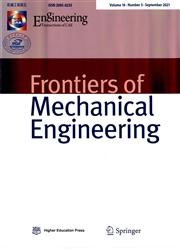Design and development of the solar cycloidal thermal concentrator and tapered receiver assembly along with theoretical evaluation of system performance
IF 4
2区 工程技术
Q1 ENGINEERING, MECHANICAL
引用次数: 0
Abstract
In this paper, the design and development of a solar cycloidal concentrating system along with utilization of the tapered receiver is presented. For the determination of the performance of the system, theoretical analysis was carried out. The novel concept of utilizing a tapered receiver for a solar cycloidal concentrating system is an innovative approach for this research. After the determination of various parameters for this system, a patent was filed and published under the patent No. 202021028009A on 31 July 2020. For the comparative study purpose, the author has taken three receivers with a constant concentration ratio and different diameters such as .038 m, .031 m, and .025 m. Theoretical evaluation of the system is estimated using modes of heat transfers and using the relation of energy balance. Various correlations are determined for an analytical evaluation purpose. By using graphical collation of all the results for all the three receivers, the author has proposed to use a tapered receiver with the variable CR. CR denotes the concentration ratio. A concentration ratio is defined as the ratio of the area of an aperture to the area of a receiver. In this research, a variable concentration ratio (CR) is used. The receiver used has a diameter which reduces from the inlet to the outlet, and hence, the intercept factor decreases and the concentration ratio increases, leading to an enhancement in efficiency.太阳摆线热集中器和锥形接收器组件的设计、开发以及系统性能的理论评估
本文介绍了利用锥形接收器的太阳能摆线聚光系统的设计与研制。为了确定系统的性能,进行了理论分析。利用锥形接收器的太阳能摆线聚光系统的新概念是本研究的创新方法。在确定了该系统的各种参数后,于2020年7月31日申请并公布了专利号为202021028009A的专利。为了进行比较研究,笔者选取了三种浓度比恒定、直径分别为0.038 m、0.031 m和0.025 m的接收器。利用传热模式和能量平衡关系对系统的理论评价进行了估计。为了分析评估的目的,确定了各种相关性。通过对所有三种受精器的所有结果进行图形整理,作者建议使用锥形受精器,CR为变量,CR为浓度比。浓度比定义为孔径面积与接收器面积之比。本研究采用可变浓度比(CR)。所使用的接收器直径从入口到出口减小,因此,截距系数减小,浓度比增加,从而提高效率。
本文章由计算机程序翻译,如有差异,请以英文原文为准。
求助全文
约1分钟内获得全文
求助全文
来源期刊

Frontiers of Mechanical Engineering
Engineering-Mechanical Engineering
CiteScore
7.20
自引率
6.70%
发文量
731
期刊介绍:
Frontiers of Mechanical Engineering is an international peer-reviewed academic journal sponsored by the Ministry of Education of China. The journal seeks to provide a forum for a broad blend of high-quality academic papers in order to promote rapid communication and exchange between researchers, scientists, and engineers in the field of mechanical engineering. The journal publishes original research articles, review articles and feature articles.
 求助内容:
求助内容: 应助结果提醒方式:
应助结果提醒方式:


